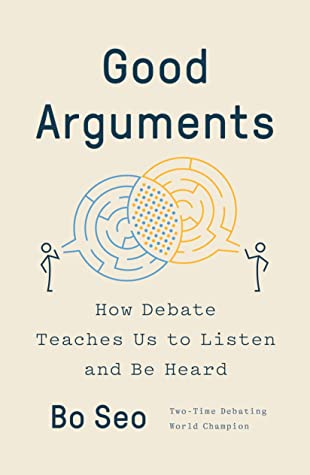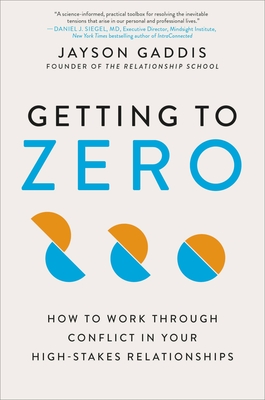Does that sound like an oxymoron? A good argument. Think of the last time you argued with someone: did the conflict get resolved, or did you both give up and/or agree to disagree*? (Or agree to cut ties, even?) When was the last time an argument or debate that you had actually ended with both you and the person you were arguing with coming to an understanding of what the other had said, both of you knowing that each understood what the other meant instead of just repeating your own point and trying to convert the other?
I’m reminded of one time I took up a debate just for fun in university with my friend while we were working away in the print studio. I think of it as one of the examples in my life of how good a good debate can go and how fun it can be: no ad hominem attacks, no tempers flaring, no voices raised. We took each other’s arguments into consideration and came back with counterarguments, and when we ran into a case where it seemed like maybe we had too vague a term in place (“morality”), we decided to define it together in order to make sure we knew what we were debating about (just think of the last time the term “political correctness” was brought up in an argument: wouldn’t we do better to define our terms?). In part, I think this was because both of us knew that whatever side we were arguing for didn’t actually say anything about us as people (i.e. we weren’t committed to our sides and didn’t identify with them**), so we took it in good fun and really listened. There was also I think an implicit agreement that we both understood this exercise to be a debate, and that we would both adhere to the unspoken rules of being respectful, not interrupting, and not making it personal. Mostly, it sticks around in my memory because another friend of ours also working in the studio at the time said to us as we wound down our arguments: “I don’t think I’ve ever heard an argument go like this before. You two were so respectful, didn’t attack each other, didn’t raise your voices, and you’re actually listening to one another! That’s amazing!” And it kind of was. But it also occurred to me that that shouldn’t have been amazing at all: is the bar this low?***
*I’d say these are actually potentially 2 separate potential endings: giving up is agreeing to disagree because the argument no longer feels like it’s worth pursuing. Agreeing to disagree doesn’t necessarily mean giving up, I don’t think – there’s a glimmer of potential here in better understanding the other person’s perspective and, even if you haven’t changed the other person’s mind, agreeing to disagree with a greater understanding and appreciation for the other person’s point of view is still a win in my opinion. Of course, people go into arguments and debates for different reasons, so this can be viewed as a loss too!
**Thank goodness for that, or my friend might’ve walked away thinking I thought murder not to be an immoral action. Though we didn’t settle the debate, if I remember correctly: neither of us could fully say it was either moral or sufficiently convince the other it was not, which I believe we attributed mostly to the fact that “morality” was too vaguely defined.
***Yes. As with many other bars that shouldn’t be on the ground or below it, unfortunately.
In Good Arguments, Bo Seo discusses, among other things, how he got into the world of debate and how it opened up an opportunity to him and many others: what makes for a good argument or debate; how do we determine when to take up a debate in ordinary life (as compared to in the world of competitive debate); are there things that don’t make good debate topics, or is everything fair game?; what purpose debate serves, and what we have to lose when we don’t learn how to debate and argue well; and when do you stop? Seo confirmed a lot of what I already kind of understood, in much more concrete terms & explored in more detail than my inchoate feelings about the topic, of course. One of the things I loved from Good Arguments in one of the later chapters was the reframing of the role of conviction in disagreements: “In short, conviction was less an input than an output. The aim of a disagreement was not to safeguard our prior beliefs from outside attack but to play and experiment until we stumbled on ideas worthy of our commitment. We did not have to have things worked out in order to get started” (Seo, Good Arguments: Chapter 8: Relationships). It involves an openness to accepting that we don’t have everything figured out, and it’s not about just defending our views! I’m not suggesting this is easy, because it’s not, especially when our views are tied to our identities (as they are not in competitive or friendly debate where that’s understood – also, in debate you sometimes have time to do research, sooooo that’s different in interpersonal conflict). So what’s the prescription?
From Good Arguments, I’d say the prescription is practice. How did Seo level up his debating game? Through intentional practice. Start small and work your way up. Change the perspective you’re presenting your point of view from. It’s not an easy solution, it’s not glamorous, and it’s not even always a straight path where you have somewhere well labeled to arrive at. It’s not something you can scale, as Seo himself admits: the impact having good arguments with people has on society is through individual change, one argument at a time. So here’s to having more productive arguments!*
*I say this as a highly conflict-avoidant person, so I will kindly allow you to get the ball rolling 🙂
If you’d like some titles with a bit more prescriptive content for how to argue better, check out some of these:
- Conflicted: How productive disagreements lead to better outcomes by Ian Leslie (2021)
- High Conflict: Why we get trapped and how we get out by Amanda Ripley (2021), also available as an e-book on Overdrive
- Thank You for Arguing: What Aristotle, Lincoln, and Homer Simpson can teach us about the art of persuasion by Jay Heinrichs (2017)
- Beg to Differ: The logic of disputes and argumentation by Joseph Agassi (2016)

